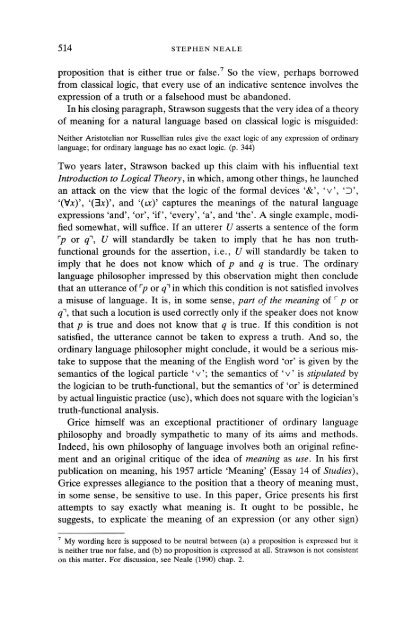Paul Grice and the philosophy of language
Paul Grice and the philosophy of language
Paul Grice and the philosophy of language
Create successful ePaper yourself
Turn your PDF publications into a flip-book with our unique Google optimized e-Paper software.
514 STEPHEN NEALE<br />
proposition that is ei<strong>the</strong>r true or false. 7 So <strong>the</strong> view, perhaps borrowed<br />
from classical logic, that every use <strong>of</strong> an indicative sentence involves <strong>the</strong><br />
expression <strong>of</strong> a truth or a falsehood must be ab<strong>and</strong>oned.<br />
In his closing paragraph, Strawson suggests that <strong>the</strong> very idea <strong>of</strong> a <strong>the</strong>ory<br />
<strong>of</strong> meaning for a natural <strong>language</strong> based on classical logic is misguided:<br />
Nei<strong>the</strong>r Aristotelian nor Russellian rules give <strong>the</strong> exact logic <strong>of</strong> any expression <strong>of</strong> ordinary<br />
<strong>language</strong>; for ordinary <strong>language</strong> has no exact logic. (p. 344)<br />
Two years later, Strawson backed up this claim with his influential text<br />
Introduction to Logical Theory, in which, among o<strong>the</strong>r things, he launched<br />
an attack on <strong>the</strong> view that <strong>the</strong> logic <strong>of</strong> <strong>the</strong> formal devices '&', 'v', 'D',<br />
'(Vx)', '(3x)', <strong>and</strong> '(tx)' captures <strong>the</strong> meanings <strong>of</strong> <strong>the</strong> natural <strong>language</strong><br />
expressions '<strong>and</strong>', 'or', 'if', 'every', 'a', <strong>and</strong> '<strong>the</strong>'. A single example, modified<br />
somewhat, will suffice. If an utterer U asserts a sentence <strong>of</strong> <strong>the</strong> form<br />
rp or q~, U will st<strong>and</strong>ardly be taken to imply that he has non truthfunctional<br />
grounds for <strong>the</strong> assertion, i.e., U will st<strong>and</strong>ardly be taken to<br />
imply that he does not know which <strong>of</strong> p <strong>and</strong> q is true. The ordinary<br />
<strong>language</strong> philosopher impressed by this observation might <strong>the</strong>n conclude<br />
that an utterance <strong>of</strong> rp or q7 in which this condition is not satisfied involves<br />
a misuse <strong>of</strong> <strong>language</strong>. It is, in some sense, part <strong>of</strong> <strong>the</strong> meaning <strong>of</strong> r p or<br />
qT, that such a locution is used correctly only if <strong>the</strong> speaker does not know<br />
that p is true <strong>and</strong> does not know that q is true. If this condition is not<br />
satisfied, <strong>the</strong> utterance cannot be taken to express a truth. And so, <strong>the</strong><br />
ordinary <strong>language</strong> philosopher might conclude, it would be a serious mistake<br />
to suppose that <strong>the</strong> meaning <strong>of</strong> <strong>the</strong> English word 'or' is given by <strong>the</strong><br />
semantics <strong>of</strong> <strong>the</strong> logical particle 'v'; <strong>the</strong> semantics <strong>of</strong> 'v' is stipulated by<br />
<strong>the</strong> logician to be truth-functional, but <strong>the</strong> semantics <strong>of</strong> 'or' is determined<br />
by actual linguistic practice (use), which does not square with <strong>the</strong> logician's<br />
truth-functional analysis.<br />
<strong>Grice</strong> himself was an exceptional practitioner <strong>of</strong> ordinary <strong>language</strong><br />
<strong>philosophy</strong> <strong>and</strong> broadly sympa<strong>the</strong>tic to many <strong>of</strong> its aims <strong>and</strong> methods.<br />
Indeed, his own <strong>philosophy</strong> <strong>of</strong> <strong>language</strong> involves both an original refinement<br />
<strong>and</strong> an original critique <strong>of</strong> <strong>the</strong> idea <strong>of</strong> meaning as use. In his first<br />
publication on meaning, his 1957 article 'Meaning' (Essay 14 <strong>of</strong> Studies),<br />
<strong>Grice</strong> expresses allegiance to <strong>the</strong> position that a <strong>the</strong>ory <strong>of</strong> meaning must,<br />
in some sense, be sensitive to use. In this paper, <strong>Grice</strong> presents his first<br />
attempts to say exactly what meaning is. It ought to be possible, he<br />
suggests, to explicate <strong>the</strong> meaning <strong>of</strong> an expression (or any o<strong>the</strong>r sign)<br />
7 My wording here is supposed to be neutral between (a) a proposition is expressed but it<br />
is nei<strong>the</strong>r true nor false, <strong>and</strong> (b) no proposition is expressed at all. Strawson is not consistent<br />
on this matter. For discussion, see Neale (1990) chap. 2.














